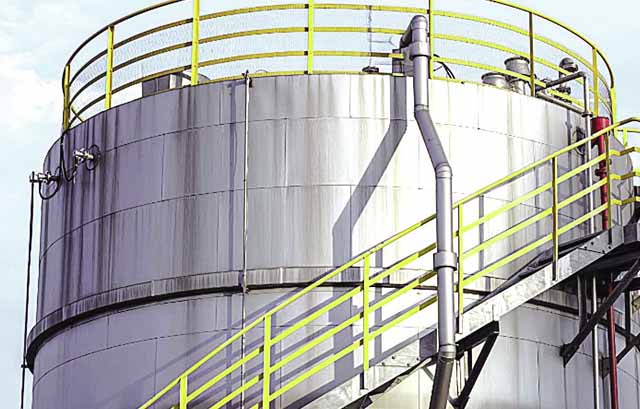By Nomfanelo Maziya | 2024-05-30

Eswatini is grappling with a shortage of fuel storage capacity as daily demand outstrips available storage.
This is according to the Eswatini Energy Regulatory Authority Bi-Annual Compliance report –petroleum Industry 2023/24.
The report indicates that current storage capacity allows the country to achieve a maximum compliance level of only 25.8 per cent with fuel supply regulations.
This is a significant drop from the previous reporting period, where the utilisation rate was 59 per cent, according to the report.
It underscored that the average daily demand for fuel in Eswatini currently sits at 92 476 litres. However, the maximum storage capacity across all facilities is only enough to meet demand for 3.6 days.
This shortfall necessitates investment in new or expanded storage facilities to ensure compliance with regulations, according to the report.
“The average daily demand for the country, in this reporting period stood at 927 476 litres, resulting in the currently available storage capacity amounting to a maximum of 3.6 days.
This therefore means the country can at best achieve a 25.8 per cent compliance level when all the available storage facilities are fully utilised, indicating the need for investments or expansions in new fuel storage facilities,” reads the report.
It further emphasises that the fuel industry in the country is undergoing a transformation.
Traditionally, multinational companies dominated the wholesale market, with their established presence and control over the supply chain.
However, recent years have seen the emergence of new, local players, according to the report.
“Lately, the industry has seen the exit of those multinational oil giants and the emergence of newer wholesale companies, who no longer have that much global presence and control on the upstream and midstream value chain.”
This shift, according to the report, presents both challenges and opportunities. While local participation is positive, the lack of global reach among these newer companies raises concerns about fuel supply security. Local entrepreneurs, however, see this as an opportunity to carve a niche in the wholesale space.
“This has presented the industry with a new set of challenges, most of which border around the issue of security of fuel supply. Local entrepreneurs have seized the opportunity to also take part and make a mark in the wholesale space,” it reads.
As of this reporting period, ESERA reported that Eswatini has 10 licensed fuel wholesalers, with an even split between local and foreign ownership.
“Worth noting is the fact that only three out of 10 licensed wholesalers have operational fuel storage facilities, which is one of the major reasons behind the supply challenges facing the country,” reads the report.
It also cites that the list of wholesalers and storage capacities during the period under reveiw yielded a storage total of 3 345 000 litres.
Galp Eswatini boasts the largest storage capacity at 1 795 000 litres, followed by Engen Eswatini at 910 000 litres and Puma Energy Eswatini 640 000 liters.
The report further notes that activities of retail license holders involved purchasing fuel products from licenced wholesalers and selling them to the final consumers.
“This part of the fuel supply chain interacts directly with the consumer and is, by and large, expected to ensure that the highest safety, health and environment standards are upheld during their operations,” reads the report. It further notes that they are also responsible for ensuring the availability of good quality fuel at the point of sale for the consumer.
Over this reporting period, the authority reports having monitored the compliance of 104 licensed retailers, 15 of which were new business establishments that had not yet started business operations but were at various stages of the construction of their retail service stations.
“Their compliance performance was measured against a set criterion whose focus was mainly on regulatory compliance, operational safety, plant and equipment maintenance, and emergency preparedness within the context of relevant regulations and acceptable industry standards,” it said.
The report further reveals that the compliance level of operational retailers in the Kingdom of Eswatini, over this reporting period, was at an average of 80 per cent, a significant improvement when compared to the previous reporting period where compliance was at 73 per cent.
“While compliance improvements were noted in most retail sites, there were those sites that performed worse when compared to the previous reporting period.
A general improvementwas noted on all the sites that had performed below 50 per cent in the previous reporting cycle,” reads the report.
It also notes that two sites were found non-operational when visited for inspections, while three new sites were commissioned during this reporting period. “Common issues at the poorly performing retail sites in rural areas border around the unavailability of proper and functional infrastructure to ensure safe and environmentally compliant delivery of petroleum products to customers,” it reads.
The report further underscored that most of these issues required a substantial amount of capital to resolve, while some of the issues were capacity-building challenges that could be resolved at much lesser costs.
“In this reporting period, the Authority observed significant improvements in most of these sites in response to compliance notices issued. Some of the sites are temporarily closed for renovations,” declared ESERA.
share story
Post Your Comments Below

OVER 300 Emaswati that invested with Ecsponent Eswatini (Pty) Ltd yesterday heeded to Judge Khont...

Eswatini's longstanding membership in the various regional integration arrangements has positione...


SOUTH African multi-award-winning gospel ensemble, Worship House is building partnerships in Eswa...
All material © Swazi Observer. Material may not be published or reproduced in any form without prior written permission.
Design by Real Image Internet